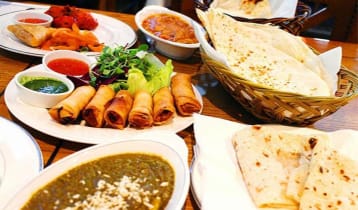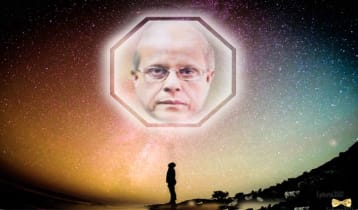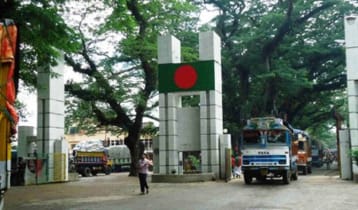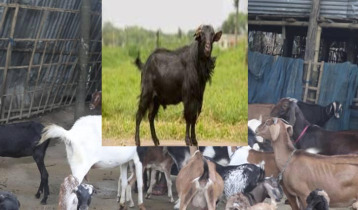Urdu used as villain: Haikel Hashmi
By Fairooz Saiyara || risingbd.com
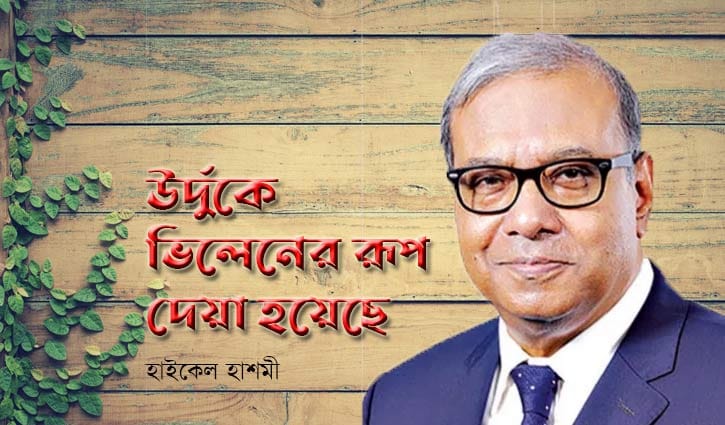
Haikal Hashmi, professionally he is a banker and quite well-known in the Banking Industry of Bangladesh. However, in the literary arena, his identity as a poet, story writer, and translator precedes his professional one. With an experience of more than a decade in the literary circle, Hashmi is one of the very few Bangladeshi Urdu speaking writers. How has it been for him in a challenging historical condition amidst the mainstream literary figures? Talked to him about all this.
Fairooz: Bengali, Urdu, and English – you have been writing and translating in all three languages. Which language makes you more comfortable in expressing yourself?
Hashmi: I actually have no preference. For example, Urdu was never my academic language. I have never studied anything in Urdu at the school or college level. I learned Bengali and English academically. But perhaps, I can best express myself in English though I feel naturally connected to both Bengali and Urdu. I think every language has some specific aspects that can be best expressed in that particular language only. Ghazals are best written in Urdu, Bengali Ghazals are mainly religious songs. But if you want to write poems which have emotions, love and feelings then there is no language better than Bengali. Some abstract expressions on the other hand are easily understood in English all over the world. So, when I write I drift between one language to another. All three languages make my ‘self’.
The same thing is connected to reading. You will never get the same essence of Rabindranath in English no matter how good the translation is. If you read Rumi, it’s best to read him in Persian. If the ‘Kalam’ of Bulleh Shah is read in Bengali instead of Punjabi, there is a chance that you will be unable to even understand the main idea. For this inner satisfaction, I have tried to learn a few languages such as Persian, Punjabi, Hindi. I can make some sense of French, and Italian because I studied my Master in Banking and Finance from a University in Milan, Italy.
Fairooz: What kind of mentality do you notice among the readers and publishers of Bangladesh regarding Urdu literature? To what extent has the political history of Bangladesh impacted this impression?
Hashmi: After the declaration of Mr. Jinnah in 1948 about making Urdu the sole state language of Pakistan, the animosity regarding the Urdu language grew as if Urdu was an enemy of Bengali language and culture. Urdu has been visualized this way. But interestingly, even Mr. Jinnah who said, “Urdu and Urdu shall be the state language of Pakistan,” did not speak Urdu as his mother tongue. He was a Gujarati. I think Urdu was never limited to any particular area. For instance, Bengali is spoken in Bangladesh, Punjabi in Punjab, and Baluch in Balochistan. But there was and is no such place called ‘Urdustan’. The Urdu language has been a victim of politics both in Pakistan and India. In India people think Urdu is the language of Muslims and Hindi of Hindus. But the two languages have no affinity with religions, and they are very similar to one another. If you say, “Aapka naam keya hai? (What is your name?),” it is the same in both Urdu and Hindi. There is absolutely no difference.
My father, Naushad Noori who was one the most famous poets at his time wrote a poem “Mohenjodaro” in support of the 1952 Bengali language movement. He even lost his job for that poem. There were many other Urdu-speaking people who supported Bengali and went to jail. Now when I say that I know Urdu and also write in that language, I see people accept Urdu as literature of a different language.
Fairooz: Do Urdu writers and intellectuals face any discrimination at literary conferences, book fairs, and cultural festivals which makes them hesitant to participate spontaneously?
Hashmi: The main problem is that now we do not really have any famous or well-known Urdu writers in Bangladesh. My father is dead, Ahmed Iliyas also died recently. Now, there is no one like them. And why would someone write in Urdu? No one learns Urdu here. There is no application of the language in our country which motivates someone to learn this language. When you cannot earn your livelihood through this then it doesn’t make any sense to learn the language. It has become more like learning Spanish or French just for the sake of pleasure. Even the children at Bihari camps now are more comfortable with Bengali, rather than Urdu.
Fairooz: Biharis are somewhat presented in Bihari-Bangladeshi diaspora literature. But they are almost completely missing in Bangladeshi films, music, and the cultural arena. What do you think about it?
Hashmi: Actually, the Bihari diaspora population is very small in Bangladesh. It’s about 0.35 million which is almost unrecognizable among the 170 million people in our country. So, their impact will also be small. Since they mostly live in camps, many socio-economic opportunities do not reach them. If there were no Geneva camp in Dhaka, I think people would forget their existence. It is my view that ultimately, they will be assimilated with the mainstream population. Their present identity will be lost because of the historical necessity of merging and assimilating with the larger population. You know all the rivers and rivulets merge with the ocean.
I see myself belonging to the last generation of the Bihari diaspora who can speak, read and write in Urdu. I don’t know if my Urdu is correct at all because I have no formal education in Urdu. Now, Urdu is taught at Dhaka and Rajshahi universities as an academic subject where most of the students come from Madrasa backgrounds. But without learning Urdu at the younger levels, if someone studies Urdu at the graduate level, how can s/he be able to understand Ghalib?
Fairooz: The new-generation Urdu-speaking children are studying in Bengali institutionally. Do they have any opportunity to exercise Urdu outside their home? This way, is it possible that in the future both the Bangladeshi Urdu-speaking community and the Urdu literature writing will be more weakened?
Hashmi: Of course, they will be smaller and more weakened. Both my parents were Biharis. But my children do not know Urdu. They understand but are unable to speak or write. People living in camps have a similar situation. You also need to understand one more important thing. The language of Biharis is not Urdu. They used to speak either Maithili or Bhojpuri. Urdu was the lingua franca. It was a common means of communication among the non-Bengali people. Even my parents did not really speak Urdu, they used to speak Maithili.
Fairooz: As the son of the late poet Naushad Noori, what do you think of the way our media presents the Biharis both at the time of our war of independence and later?
Hashmi: I was just 11 years old at the time of the war. Now I am 63. No one of the Bihari generation of that period is alive to experience the media stereotype. But we did face such stigmas. They were used by the Pakistanis to counter Bengali aspiration by manipulating their 1947 partition experience. They were brainwashed that they sacrificed their homes and families for Pakistan. Another tragedy was that this diaspora had no sensible leadership. Biharis have always been targeted after the liberation war as the known enemy of Bengalis. But you will find a new generation of Biharis who love Bangladesh as their own country. Just portraying them in kurta-pajamas and tupi with broken Urdu in cinemas does not present the way they are.
Fairooz: You have published six translations of Urdu short stories including two volumes of “Bangladesher Urdu Choto Golpo” and two volumes of “Upomohadesher Urdu Choto Golpo” beside that collection of stories of Saadat Hasan Manto and Muhammad Jamil Akther. Your books of poetry in a total of five collections are published. Are you writing anything new keeping the 2024 Amor Ekushey Boi Mela?
Hashmi: Yes, I am translating Gulzar’s short stories which will come into print this time. I am also translating a collection of poems by Obayed Akash from Bengali to English. Apart from the translations, my own collection of short stories is in progress.
Dhaka/Mukul

